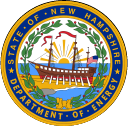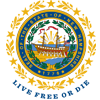Home Efficiency Rebates Program
Home Efficiency Rebates Program for New Hampshire
Home Energy Rebates Program Solicitation of Written Comment
The NHDOE is requesting written comment from residential contractors and retailers on topics and program design elements that the Department should consider as it continues to develop both the Home Efficiency Rebates Program and the Home Electrification and Appliance Rebates Program. View the solicitation below for more information.
Home Efficiency Rebates Program Information
This rebate program was created as part of the Inflation Reduction Act (IRA). The IRA offers $4.3 billion in formula grants to states to reduce the upfront cost of whole-home energy efficiency upgrades in single-family and multi-family homes. Under this program, the New Hampshire Department of Energy (NHDOE) is slated to receive $34,882,819 through September 2031.
Rebate amounts for consumers will be dependent on either the modeled energy savings or the measured savings of the project, the income of the household, and whether it is a single family or multifamily building.
The United States Department of Energy (USDOE) issued revised guidance in October 2023 with additional resources given in November 2023. This guidance indicated that projects begun on or after August 16, 2022, that meet state and federal Home Efficiency Rebates Program requirements qualify to receive a rebate.
Currently, Home Efficiency Rebates Program funding is not available to NH consumers. NHDOE is hiring new staff to oversee this program and to apply for the state’s formula allocation. NHDOE reiterates to consumers that federal guidance remains fluid, and they should be cautious about undertaking projects before NHDOE has applied for funding and established its program.
Single Family:
- 20-35% modeled energy savings: $2,000 or 50% of project costs, whichever is less
- 35%+ modeled energy savings: $4,000 or 50% of project costs, whichever is less
- 15% minimum measured energy savings: payment rate per kwh saved, equal to $2,000 for a 20% cost reduction for the state’s average home, or 50% of the project total
Low Moderate Income Single Family:
- 20-35% Modeled Energy savings: $4,000 or 80% of project costs, whichever is less
- 35%+ Modeled Energy savings: $8,000 or 80% of project costs, whichever is less
- 15% minimum measured energy savings: payment rate per kwh saved, equal to $4,000 for a 20% cost reduction for the state’s average home, or 80% of the project total
Multi Family:
- 20-35% Modeled Energy savings: $2,000 per dwelling unit maximum, $200,000 per building maximum
- 35%+ Modeled Energy savings: $4,000 per dwelling unit maximum, $400,000 per building maximum
- 15% minimum measured energy savings: payment rate per kwh saved, equal to $2,000 for a 20% cost reduction for the state’s average home, or 50% of the project total
- Multi Family with 50% occupied by Low Moderate Income households:
- 20-35% Modeled Energy savings: $4,000 per dwelling unit maximum
- 35%+ Modeled Energy savings: $8,000 per dwelling unit maximum
- 15% minimum measured energy savings: payment rate per kwh saved, equal to $4,000 for a 20% cost reduction for the state’s average home, or 80% of the project total.
FAQs:
Is NHDOE applying for the federal funds for this program?
Yes, NHDOE is applying for its formula allocation of $34,882,819 under the Home Efficiency Rebates Program.
When will these rebates be available?
NHDOE intends to file an application for Home Efficiency Rebates Program funding in late spring 2024, with rebates available later in 2024.
NHDOE must file an application with USDOE to receive its Home Efficiency Rebates Program funding. The application must detail NHDOE’s program design and how rebates would be given to consumers. These applications are complex and require a significant amount of time and coordination to complete. Once submitted, USDOE will then review the application and either approve it as written, or request changes. USDOE will review and approve applications on a rolling basis, but it has not indicated how long that review and approval process will take.
What steps is NHDOE taking to file its Home Efficiency Rebates Program application?
NHDOE applied for early administrative funds from USDOE to build out staff capacity to apply for Home Efficiency Rebates Program funding and to design the state’s program. NHDOE recently received approval through state processes to accept and expand those early administrative funds. NHDOE intends to onboard additional staff early next year.
How can I get a rebate?
This will depend on a variety of factors, but foremost in NHDOE’s consideration for program design is to make this process as easy and seamless as possible to access and done in conjunction with existing energy efficiency programs. Further information will be posted here as it becomes available.
Can I get a rebate for work already done?
Potentially. Per Programs Requirements & Application Instructions, Version 1.1, Home Efficiency Rebates Programs managed by states must provide rebates to projects that are initiated on or after August 16, 2022 and meet all other federal and state programmatic requirements. However, NHDOE is urging consumers to be patient as federal guidance has evolved and NHDOE works to design its program.
How much of a rebate can I get under the Home Efficiency Rebates Program?
The size of the rebate is dependent upon the modeled energy savings or the measured savings of the project, the income of the household, and whether it is a single family or multifamily building.
How is “Low Moderate Income” defined?
“Low Moderate Income” is defined as 80% of area median income.
How do I find area median income for my area?
USDOE has not identified which version of area median income (AMI) they will require (metro area vs statewide, etc.) For reference, the 80% of statewide area median income for a family of 4 is $91,500. As additional information is provided by USDOE of how to determine AMI, this section will be updated.
Where can I see USDOE’s latest Home Efficiency Rebates Program updates?
Consumers are encouraged to visit USDOE’s Home Energy Rebates Program webpage. NHDOE will strive to keep this website revised with the latest information. Consumers can also access USDOE’s FAQ webpage.
What other federal incentives may be available to consumers in New Hampshire?
USDOE set up a platform called the Energy Consumer Savings Hub. This Hub details the federal incentives available for consumer appliances, electric vehicles, and various home improvements. Please note that NHDOE does not provide advice or guidance on federal tax credits. Consumers are strongly advised to consult with a qualified tax professional.
Page last updated: 06/26/2024



